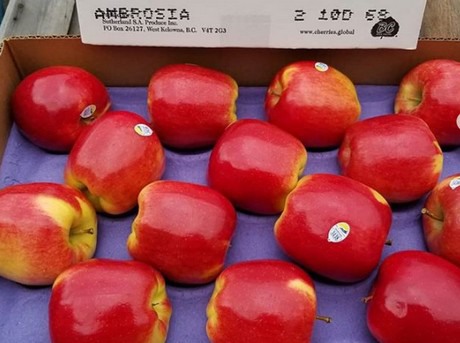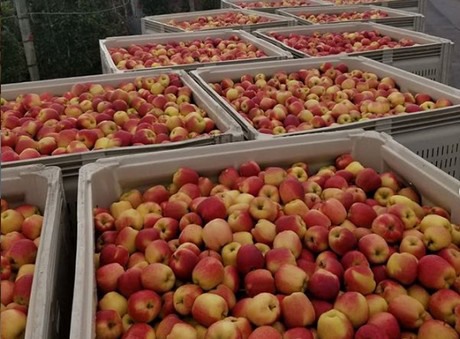Canadian apple growers are increasing their acreage of Ambrosia apples in response to rising demand for the variety. Exporters are also building on the growing demand from overseas as well. Ambrosia is available for much of the year now with production sufficient for availability to span 11 months.
"We begin harvesting Ambrosia in mid-September into October," shared Rick Chong of Sutherland S.A. Produce. "After harvesting, we place a large percentage of our fruit into controlled atmosphere storage which ensures supply this year is available from late September through August 2019. The crop continues to increase significantly each year, with annual volumes in Canada continuing to grow by double-digits. Consequently, developing a successful export program has become a necessity to ensure a healthy domestic market in Canada and the United States."

Export programs
Asia and the Middle East are proving to be important markets for Canadian-grown Ambrosia apples. Chong said that the biggest market for Sutherland S.A. Produce is Vietnam, but the company also exports to Thailand, Cambodia, Hong Kong, Taiwan and Dubai. But Canada is not the only one exporting.
"Along with increasing acreage in Canada, Washington State tonnage is also increasing," Chong noted. "Canada must continue to be the leader in quality standards. Competition is fierce, however the Ambrosia apple originates in Canada and the world recognizes us as the best."
"We have had to develop a 'Red Mite Free' program to meet existing protocols, with Taiwan having the strictest requirements," he continued. "We pre-sort our apples by grade and size before we begin packing. This gives us the ability to pack to customer specifications and ensure we are delivering the right quality to each market. The majority of the fruit is shipped by sea."

Ambrosia is a bi-color apple
There are reportedly a number of growers that ship single-color Ambrosia. According to Chong, however, Ambrosia is a naturally bi-color apple and the presence of a single color Ambrosia apple gives cause for concern. "It's funny how many buyers forget Ambrosia is a bi-color apple variety," he explained. "Artificially creating a full-color Ambrosia damages the reputation of this variety, because it changes the flavor and the subtle differences are noticed by the consumers. We also believe it affects the interior flesh of the apple during long sea voyages. We have experimented with both and are seeing significantly better sea arrivals growing this apple naturally without the use of reflective materials."
He concluded by sharing that acreage for organic Ambrosia apples continues to increase in line with consumer demand for an organic option. "We believe 'Certified Organic' is the fastest growing category today and will continue to expand this category with larger export volumes of Ambrosia. Clamshell packaging is also becoming more popular as retailers look to offer consumers more choice, and premium selections."
For more information:
Rick Chong
Sutherland S.A. Produce, Inc.
Ph: +1 (403) 616-1977
[email protected]
www.cherries.global
